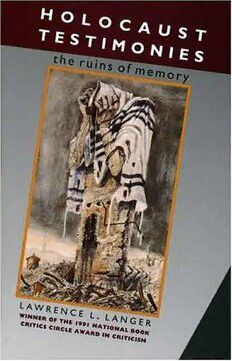
Holocaust Testimonies: The Ruins of Memory PDF
232 Pages·1991·0.787 MB·English
Most books are stored in the elastic cloud where traffic is expensive. For this reason, we have a limit on daily download.
Preview Holocaust Testimonies: The Ruins of Memory
Description:
A sustained analysis of the ways in which oral testimonies of survivors contributes to the understanding of the Holocaust, this book also aims to shed light on the forms and functions of memory as victims relive devastating experiences of pain, humiliation and loss. Drawing on the Fortunoff Video Archives for Holocaust Testimonies at Yale University, the author shows how oral Holocaust testimonies complement historical studies by enabling one to confront the human dimensions of the catastrophe. Quoting from these interviews, Langer develops a technique for interpreting them as one might a written text. He contrasts written and oral narratives, noting that while survivor memoirs by authors such as Primo Levy and Charlotte Delbo transform reality through style, imagery, chronology or a coherent moral vision, oral testimonies resist these organizing impulses and allow instead a kind of unshielded truth to emerge, just as powerful in its impact as the visions taking shape in written memoirs. He argues that it is necessary to deromanticize the survival experience and that to burden it with accolades about the "indominable human spirit" is to slight its painful complexity and ambivalence. Finally he explores the task of establishing a meaningful connection between consequential living and inconsequential dying, between moral striving and the spirit of anguish and sense of a diminished self that pervades these Holocaust testimonies.
See more
The list of books you might like
Most books are stored in the elastic cloud where traffic is expensive. For this reason, we have a limit on daily download.
